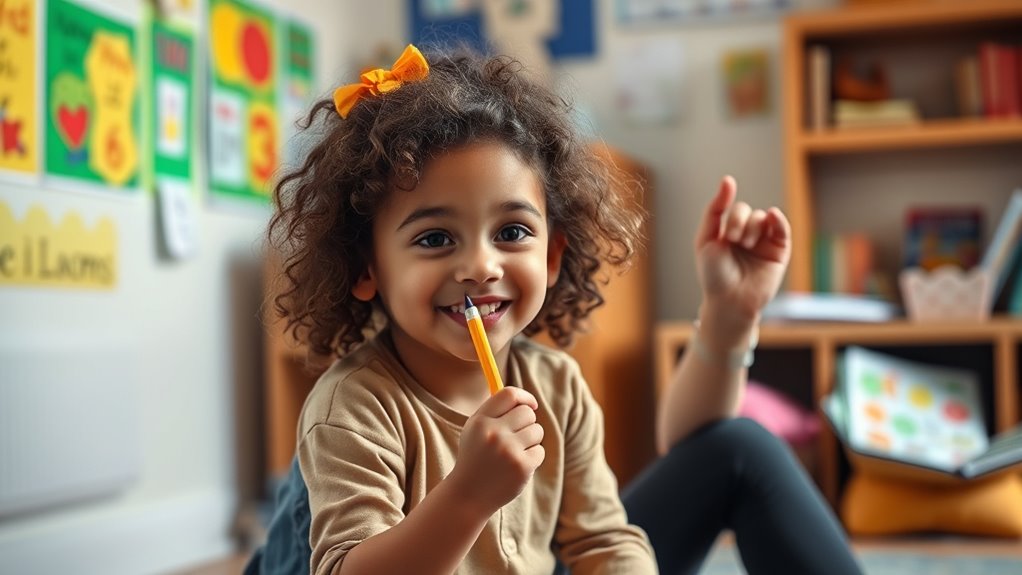To build confidence in shy kids, start with small, supportive steps like encouraging gentle peer interactions and celebrating their efforts. Create a safe environment at home where they feel comfortable sharing feelings and practicing social skills through role-playing. Use positive reinforcement and praise progress to boost their self-esteem. Gradually introduce new social settings at their pace, emphasizing patience and personal strengths. Keep supporting their growth, and you’ll see big impacts as they become more confident — learn more below.
Key Takeaways
- Start with small, supportive social interactions to gradually build comfort and confidence.
- Use positive reinforcement and celebrate even minor social efforts to encourage continued progress.
- Create a safe, judgment-free environment at home for children to share feelings and practice social skills.
- Gently introduce new social settings with patience, emphasizing that taking time is okay.
- Highlight and praise personal strengths to boost self-esteem and foster a positive self-image.

Many shy kids struggle to express themselves and face challenges in social situations, but with the right support, you can help them build confidence. One effective way is by encouraging peer interactions in a gentle, supportive manner. When your child interacts with classmates or friends, it provides opportunities to practice social skills and feel more comfortable in group settings. Start small—maybe arrange playdates with one or two trusted friends—and gradually expand these interactions as your child gains confidence. Remember, shy kids often need time to warm up, so patience is key. As they engage more with peers, praise their efforts openly and sincerely, reinforcing that their attempts to connect are valued. This is where positive reinforcement plays a vital role. When your child shows even slight progress, celebrate their courage and efforts. It could be as simple as saying, “I saw you talking to your friend today—that was brave of you!” These affirmations help them associate social interactions with positive feelings, making future attempts less intimidating.
Creating a safe environment at home also boosts your child’s confidence in peer interactions. Encourage them to share their feelings about social situations without judgment. Listening actively and validating their experiences helps them feel understood and supported. Role-playing can be particularly helpful, where you practice common social scenarios together. This prepares your child for real-life interactions and reduces anxiety. Additionally, understanding the benefits of eye patches such as improved skin hydration and reduced puffiness can serve as a confidence booster if your child is self-conscious about their appearance. As they become more comfortable, you can gently introduce them to new social settings, always emphasizing that they can take things at their own pace.
Building confidence isn’t about forcing your child into uncomfortable situations but gradually increasing their exposure with positive experiences. Offer consistent encouragement and highlight their strengths, whether it’s their kindness, creativity, or listening skills. When they see themselves succeed, even in small ways, their self-esteem grows. Remember, shy children often need more time and gentle nudges to step out of their shells, but with ongoing support, they’ll learn to navigate social situations more comfortably. Your patience and positive reinforcement lay the foundation for them to develop lasting confidence, empowering them to build meaningful peer relationships and enjoy social interactions more fully.

Junior Learning Social Skills Board Games, 4 Games, Ages 5-8, Empathy & Manners, Grade 1-2
Targets the development of essential social skills such as empathy, friendship, manners, and emotional understanding.
As an affiliate, we earn on qualifying purchases.
As an affiliate, we earn on qualifying purchases.
Frequently Asked Questions
How Can Parents Support Shy Children Without Pressuring Them?
When supporting shy children, you avoid pressuring them by encouraging independence at their own pace. You can foster social skills by creating safe opportunities for interaction, like playdates or group activities, without pushing too hard. Celebrate small successes to boost their confidence and show understanding. Your patience and gentle guidance help them feel secure, making it easier for shy kids to develop social confidence naturally and comfortably.
What Are Common Signs That Shyness Indicates a Deeper Issue?
Imagine a quiet lake suddenly turning turbulent—that’s how shyness can sometimes signal deeper issues. If you notice emotional red flags like persistent sadness, extreme social withdrawal, or avoidance of activities, it might be more than shyness. These signs often indicate underlying struggles, such as anxiety or depression, that need attention. Recognizing these clues helps you support your child better, ensuring they don’t drown in unspoken worries.
How Does Shyness Affect a Child’s Academic Performance?
Shyness can impact your child’s academic performance by limiting their participation in class and peer interactions. Social anxiety may make them hesitant to ask questions or join group activities, which can hinder learning and confidence. When kids avoid peer interactions due to shyness, they miss out on collaborative learning opportunities, affecting both their social skills and academic growth. Supporting their social confidence helps improve both classroom engagement and overall performance.
Are There Specific Activities That Help Shy Kids Build Confidence?
You might wonder if certain activities boost shy kids’ confidence. Research shows that group activities and role-playing games are effective. When you encourage participation in these, your child can practice social skills in a safe environment. These activities help them feel more comfortable speaking up and interacting. By gradually increasing their involvement, you’ll see their confidence grow, making everyday social situations easier and more enjoyable for your shy little one.
When Should Parents Consider Professional Help for Shy Children?
When should you consider professional help for your shy child? If their shyness causes persistent anxiety, social withdrawal, or impacts daily activities, it’s time to explore therapy options. Seeking emotional support from a counselor or child psychologist can help your child develop confidence and coping skills. Trust your instincts—if their behavior doesn’t improve despite small steps, professional guidance can make a meaningful difference in their social and emotional well-being.

The Original Mood Flipbook for Kids; 20 Different Moods/Emotions; Autism; ADHD; Help Kids Identify Feelings and Make Positive Choices; Laminated Pages (Spanish Flipbook)
EDUCATIONAL TOOL. Teach kids about different moods/emotions and positive actions that can be taken in a fun and…
As an affiliate, we earn on qualifying purchases.
As an affiliate, we earn on qualifying purchases.
Conclusion
Remember, every small step you take with your shy child can lead to big changes. Sometimes, a simple smile or encouraging word feels like just a coincidence, but it’s actually a powerful boost to their confidence. When you notice these tiny moments, they add up over time, shaping a more confident kid. So keep going—you might just be surprised how those small, everyday gestures create the biggest impact in their growth.

Step2 Best Chefs Kids Kitchen Playset, Indoor/Outdoor Kitchenette, Interactive Play with Lights and Sounds, Made of Durable Plastic, Includes 25 Piece Toy Accessories, For Toddlers 2+ Years Old
TODDLER KITCHEN PLAYSET: Little chefs can’t wait to whip up some fun with the Step2 Best Chefs Kitchen…
As an affiliate, we earn on qualifying purchases.
As an affiliate, we earn on qualifying purchases.

Being Me: A Kid's Guide to Boosting Confidence and Self-Esteem
As an affiliate, we earn on qualifying purchases.
As an affiliate, we earn on qualifying purchases.









